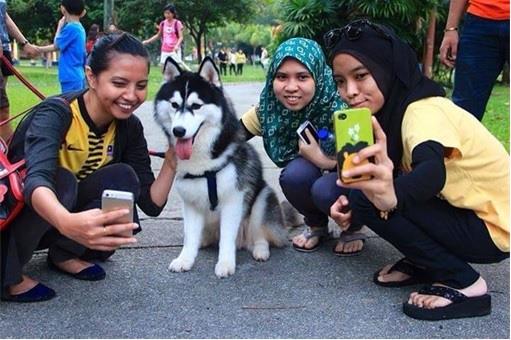Previously published on the author’s personal blog.

Source: Facebook
A few days ago, my husband killed a small mouse which had been living in our kitchen for some time (possibly a year, if it’s the same one). He meant to trap it and release it but in a moment of panic he killed it (while apologising to it and that’s why I married this dude). After the trauma of having experienced the senseless killing of an innocent animal, I lay in bed thinking about why I had such an irrational reaction to seeing the mouse crawl up and down my sofa (and coming so close to my baby!).
The only other time I do this is when I see a gecko. (Ugh, just saying the name makes me squirm). Not just any kind, but the house lizards that are found in Southeast Asia. I have such a phobia of them that I don’t even want to elaborate anymore. Suffice to say, seeing one a few metres away is enough to get me hyperventilating and getting my ass out of the room, super fast.
I don’t have the same reaction anything else. Insects like cockroaches, silverfish and ants? No problemo.
Right before I dropped off to sleep, I concluded that it was probably because I had had no close interactions with mice before. I didn’t grow up with pet mice, or ever handle one. (I did handle hamsters though.) Plus, seeing mice in the context of a pest (going after noodles, pasta, oatmeal and paper in my house) instead of a pet has sure changed my previously neutral opinion of it.
And then it totally made sense why Muslims in my social media feeds were freaking out over an event where – duly summarised – a bunch of Muslims petted a bunch of dogs, took selfies, and washed their hands afterwards. (Most of the photos are of hijabis, because don’t you know that Muslim women are the representatives of Islam?)
This event “I Want to Touch a Dog” happened in Kuala Lumpur, Malaysia on 19 October. From what I could read online, it was meant as a friendly introduction to mankind’s best friend in a friendly and safe setting with many other dog-friendly Muslims around – a rare opportunity in a community whose Islam is mostly based on the Sunni Shafi’i school of thought.
“I have seen cases of people running away at the sight of a dog, or throw stones at it. It broke my heart… How do people feel when they see an animal ill-treated, abused or knocked over?”
Did you notice I said “friendly” three times? It’s because I believe that is the intention of the organiser Syed Azmi Alhabshi. Dogs carry a great deal of stigma in our Shafi’i Muslim community (I include Singapore, Brunei, Indonesia and Malaysia in this category); a stigma that extends to any Muslim that handles or owns a dog (see for example, dog trainer Maznah Yusof). Syed Azmi did well: he gave a heads up to the Selangor Mufti Department, invited an ustaz, Mohd Iqbal Parjin from UTM’s Centre for Advanced Studies on Islam, Science and Civilisation (Casis) to speak about the ruling on dogs and how participants could do sertu or ritually cleanse themselves, and provided facilities for washing. All bases covered, you’d hope.

This niqabi agrees. Source: Facebook
Alas, there was so much negative reaction to the event. People went berserk on Facebook, commenting under the images of hijabis carrying different kinds of cute puppies. Add to the mix a smattering of suspicion that the event is just part of a larger conspiracy to promote “liberalism” and “pluralism” in Muslim circles.
I organised this event because of Allah, not to deviate the people’s faiths, try to change the Islamic rules of law, poke fun at the ulama or encourage pluralism.”
Meanwhile, the evening news in Brunei broadcasted a press statement from the ministry of religious affairs that “even though Islam has the provision of sertu to cleanse after touching najis mughallazah [major impurity], this is not an excuse to touch such things on purpose. Doing so is akin to someone who commits a sin with the excuse that one can repent for it afterwards.”
The response from religious authorities in Malaysia were a little more mixed. Here’s a great summary about the official response from Zurairi AR for The Malay Mail:
“…the religious authorities were at a loss to deal with the younger set of Muslims who chafe at the way they are being “managed” and not allowed to question how their creed is practised here.
The authorities reacted the only way they know how. They insisted that within the country’s borders, not only is the Sunni denomination and the Shafi’i school of jurisprudence the only right way to practise Islam, but Muslims must also accept only Jakim’s interpretation of the religion.
…younger Malaysian Muslims with access to a wider pool of information on Islam today are finding they have less in common with the country’s muftis and ulamas. As such, the Islamic religious authorities are fast losing their relevance, and with it, their iron grip on the lives of Muslims nationwide.”
I’ll be the first to admit that I do have an inner Shafi’i when it comes to dogs. (Yes, I know that there is a variety of opinions in the different jurisprudential schools of thought, but I’m not going there in this post.) Since I don’t know if a bark is friendly or snappy, my first tendency is to jump to the other side of the sidewalk when a dog starts getting too close to me me.
I react like this despite the fact that I know the Qur’an speaks positively about dogs: an animal caught by a hunting dog is halal (5:4) and in the story of the persecuted youth hiding in a cave, a dog is stretching its forelegs at the entrance (18:18). I react like this even though I have been surprised by a farmer’s dog that followed me out into a field and hung around a few metres away as if to keep guard on me as I peed.
I am well aware that my instinctive fearful reaction to dogs and mice comes from a fear of the unknown – I’m simply not used to these animals like I am to say, cats. For that, I’m grateful and happy that there was such an event to change the attitudes, at least in this group of a few hundred Muslims in Malaysia.

Dogfies. Source: Facebook
